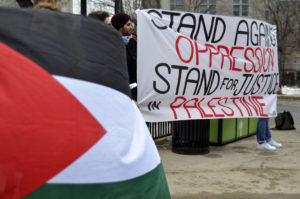Cut the BS with BDS
Most of us are familiar with the word “apartheid,” an Afrikaans word meaning “separateness.” Perhaps less familiar is the Hebrew word for separation—“hafrada”—used to refer to the Israeli government’s policy regarding Palestinian populations. Similarities between today’s Israel and apartheid-era South Africa do not end there, however. Culminating in the early nineties, South Africa was the target of many boycotts that attempted to isolate it internationally due to its racist and divisive domestic policies. The Boycott, Divestment, and Sanctions (BDS) movement seeks to do the same with Israel—to create actual consequences for its illegal settlements and relegation of Palestinians to the status of second-class citizens. In response, allies of Israel within the United States have launched campaigns attempting to delegitimize the BDS movement, with twenty-one states passing anti-BDS laws.
One of these states is Texas, where the state legislature recently passed a bill that “prohibits all state agencies from contracting with, and certain public funds from investing in, companies that boycott Israel.” In accordance with this, when the Houston suburb of Dickinson offered grant money for rebuilding in the wake of Hurricane Harvey, the application included a section requiring proof that the applicant did not boycott Israel and would not do so for the duration of the grant (this application has since been changed to clarify that this agreement is only applicable in the case of businesses, not individuals).
What’s scary here is not just that a local government is trying to restrict free speech, but that they were conforming to a state law that represents a threat to political expression in this country, and to the important work of committed activists.
Leaving the potential implications of Citizens United for another article (aren’t corporations people? Don’t they therefore have a right to take political positions?), it is important to address why anti-BDS legislation is so problematic. First of all, clearly, any attempt at restricting the right of an individual to express their political opinion is antithetical to this country’s emphasis on free speech. That’s an easy point to understand. But why are attacks on the right to oppose BDS specifically so concerning? That is a slightly more complex question. Of primary concern is that they exist to defend a country with a clear record of human rights abuses. In this way, they are par for the course; America has a long record of ignoring the sins of their friends and allies. What’s worrying is that this defense seeks to undermine the legitimacy of activists sincerely committed to seeing justice brought to the Palestinian struggle (which is somewhat ironic given that those supporting anti-BDS legislation often try to cast the movement as seeking to undermine the legitimacy of Israel).
In 1962, the United States voted no on U.N. General Assembly Resolution 1761, which condemned apartheid and proposed an international boycott of South Africa. Activists around the world, however, continued to support the cause, and eventually succeeded in isolating South Africa both economically and in public opinion. In October the United States announced that it would withdraw from UNESCO to protest what it perceived as anti-Israel bias, and it’s clear from this and the recent string of anti-BDS legislation that it is once again up to activists to continue the fight against Israel’s regressive policies and illegal actions. Yet, they are in many cases being denied the tools they need to do so.
The Israeli-Palestinian conflict is a contentious topic, but one would expect, at the very least, that restricting the ability of one of the many sides of the debate to express their position would be seen by all of us as a step too far. And yet, this has proven not to be the case, as state governments have taken it upon themselves to dictate what positions are and are not acceptable. This is especially concerning in states like Maryland, Wisconsin, and New York, where anti-BDS laws came courtesy of an executive order that lacks even the pretense of being the will of the people. Where the pendulum of public opinion will hang on the broader conflict ten years from now I can’t say, but I’m confident that history won’t look favorably upon those who acted to restrict the legitimate political expression of others.

